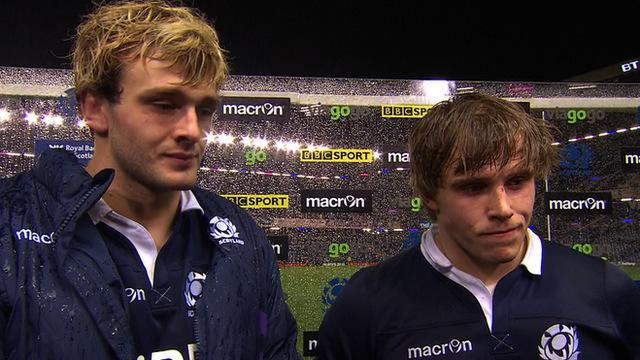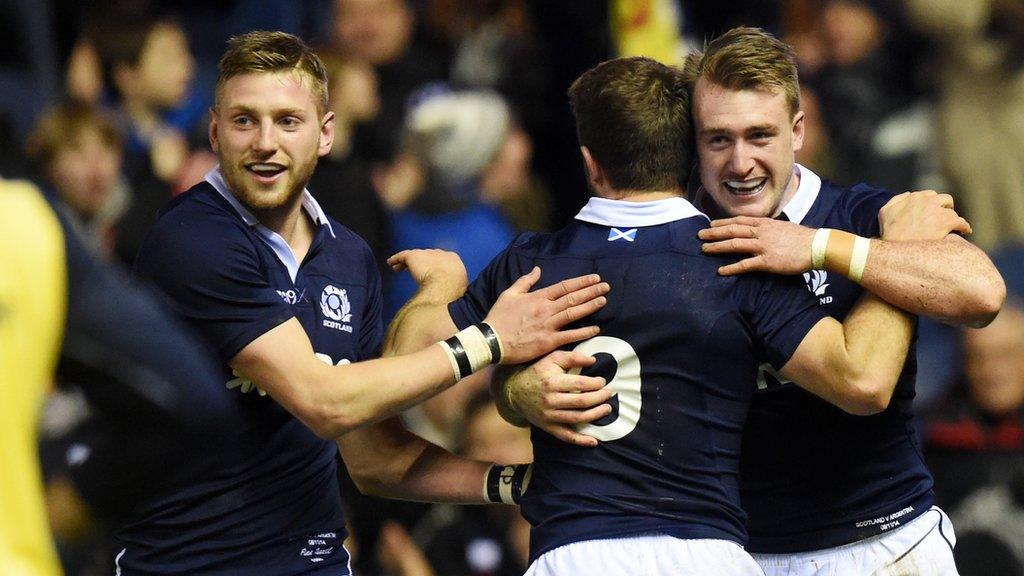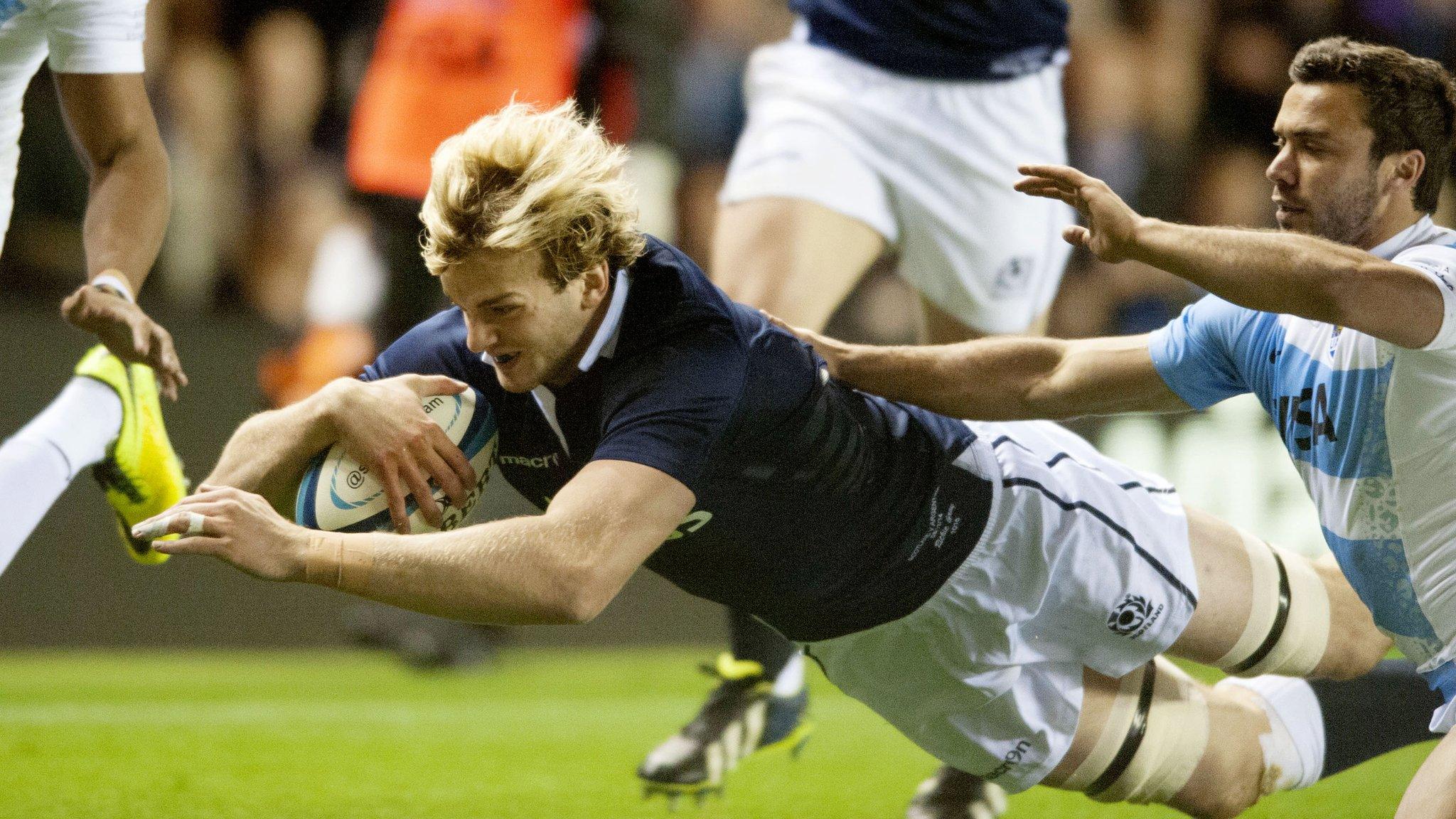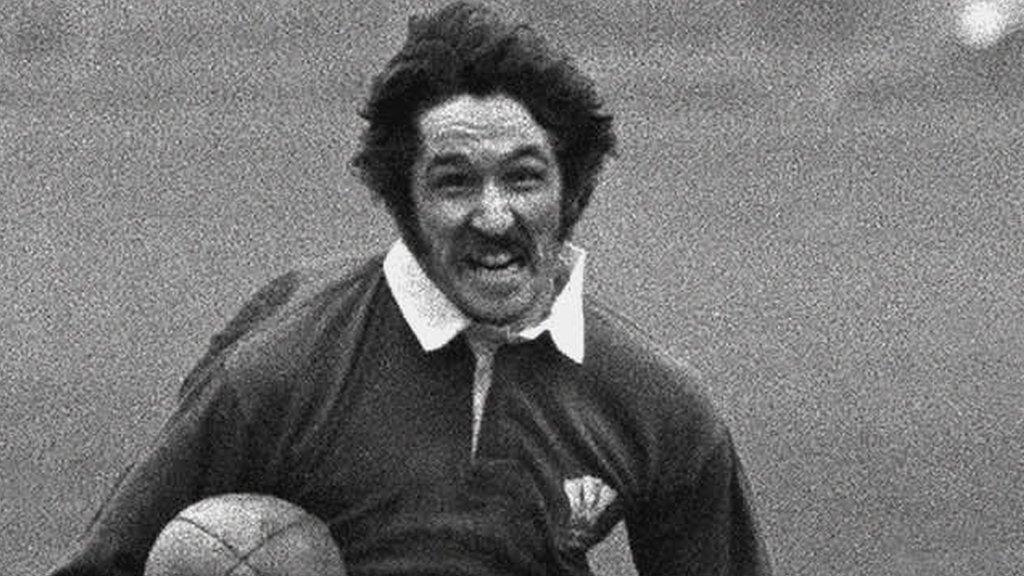Scotland: Vern Cotter's Murrayfield bow is uplifting
- Published
.jpg)
Brothers Richie (left) and Jonny scored first-half tries for Scotland at Murrayfield
In the aftermath of Scotland's 41-31 victory over Argentina, head coach Vern Cotter galloped on to the Murrayfield pitch and embraced his players one by one, crying tears of joy as he faced the television cameras while declaring this to be one of the most exhilarating days of his life and one of the most significant in the history of Scottish rugby.
He announced that Scotland were now a world power and that everybody, All Blacks included, had better watch out.
Then he floated away, singing 'Another One Bites The Dust' as he went.
OK, fair enough. He did none of those things. In the range of public emotion he goes all the way from A to B. Stern Vern.
You could have a slideshow of Cotter headshots, from happy to sad, to angry to content and it would take a team of forensic scientists to tell the difference.
It's not that he is without sentiment, it's just that he places a protective wall around himself when talking about his team and nobody is getting through it. In his rugby world, he's less Freddie Mercury and more Bob Dylan - specifically that line from his song 'Up To Me': "In 14 months I've only smiled once and I didn't do it consciously".
Autumn International highlights: Scotland 41-31 Argentina
Cotter is as far removed from Scott Johnson, his predecessor, as it is possible to be. Johnson was all one-liners and poor performances.
The New Zealander, on the other hand, lets his team do the talking for him. And for an hour against Argentina they were as fluent as a Scottish team has been against a high-level opponent in the past 15 years.
There were shades of Jim Telfer's Five Nations Championship winners of 1999. It's only one match, and they still have an awfully long way to go, but some of the ambition, execution and high-tempo stuff was redolent of the last time Scotland were a relevant force in northern hemisphere rugby.
Against Argentina, there were new partnerships in the midfield, at half-back, in the second row and the back row. Mark Bennett made his Test match debut. Finn Russell, Adam Ashe and Blair Cowan made their Murrayfield debuts. Jonny Gray had his first start at Murrayfield. The back row had a combined total of 11 caps.
The whole thing had a new air about it. A freshness.
There were moments that made you think that something different is on its way. Falling behind early (nothing new) only to bounce back immediately (something very new).
The patience and accuracy in the build-up to Richie Gray's score was not typical of Scotland teams. The fact that it was a second-row on the end of the move with a loose-head prop outside him on the wing calling for a pass was evidence of Cotter's mantra of dynamism in attack.
It's fair to say that Argentina played poorly, but this is a good Argentina side none the less, a side that had, in their previous Test, come from 14-0 behind to beat the Wallabies.
In the white heat of the Rugby Championship, they lost to South Africa, the second best team in the world, by two points and seven points. They came to Murrayfield with 10 of the side that downed Australia. They were, perhaps, three players short of full strength, but were deemed by many as favourites - and rightly so.
And yet, for the critical hour, they were blown away.
.jpg)
Scotland captain Greig Laidlaw was a key figure in an encouraging victory
What was striking about Scotland was their desire to play, their determination to get on the ball and make things happen. Too often, Scotland have been passive.
A new team with no baggage, they demonstrated a speed of thought and a coolness in the opposition 22 that Argentina could not live with, whether it was the composure that brought Jonny Gray his try or the cleverness and ruthlessness of Greig Laidlaw creating the third score for Sean Maitland.
What a joy it was to see Laidlaw controlling and sniping. This was the captain at his best. His rugby intelligence was writ large over this Test.
And there was an element of role-reversal that made you smile. The Pumas came out with intent at the start of the second half. They began putting the phases together, working it left and right but going nowhere. In the 45th minute they were still at it. They were on phase 14 at that point.
Things broke down. Two minutes later, Laidlaw sliced them open at the side of a ruck and sent Stuart Hogg away in the corner.
It was the kind of kick to the solar plexus that the Scotland fans know all about. Normally, it is Scotland doing the grunt and their opponent applying the sucker-punch.
Of course, there were problems in that last quarter, including two yellow cards and 21 points conceded when Scotland were down to 14 men.
Rob Harley's yellow looked soft, the opposite of the man himself who, in the nicest sense, is an almighty pest of a rugby player, a destructive force who had a profound impact on the game until he exited.
Jim Hamilton's yellow was deserved and daft at the same time. His inability to control himself at the breakdown turned a landslide win into something that looked less convincing. A 10-point margin did Scotland no justice.
'Special' day for try scoring Scotland Gray brothers
There will surely be few, if any, changes for New Zealand next week.
Bennett had little opportunity to attack but he was in the team on merit and deserves to stay. The other Murrayfield new boys ranged from solid to spectacular.
Russell revelled in it and it was a pulse-quickening moment to see a 22-year-old Scottish fly-half take to the battle with such confidence. Ashe and Jonny Gray were similarly impressive. Cowan was an effective open-side.
In his deadpan way, Cotter was pleased with what he saw, but was mindful of what's coming. The feelgood from Saturday could quickly turn into a horror show when the All Blacks bring their brand of rugby sadism to Murrayfield.
Survival is the main objective. Scottish teams in the recent past have failed to get to half-time in a semi-competitive state against New Zealand, never mind full-time.
There are reasons to believe that Cotter is on to something, but not reasons to be hysterical.
If, by full-time next Saturday, pride is intact then it's job done. They can move onwards to Tonga in Kilmarnock and, later, to the Six Nations not with the usual blind faith but with genuine hope that this young team is capable of putting Scotland back on the rugby map.
- Published8 November 2014

- Published8 November 2014

- Published8 November 2014

- Published8 November 2014

- Published14 September 2016

- Published25 August 2011
